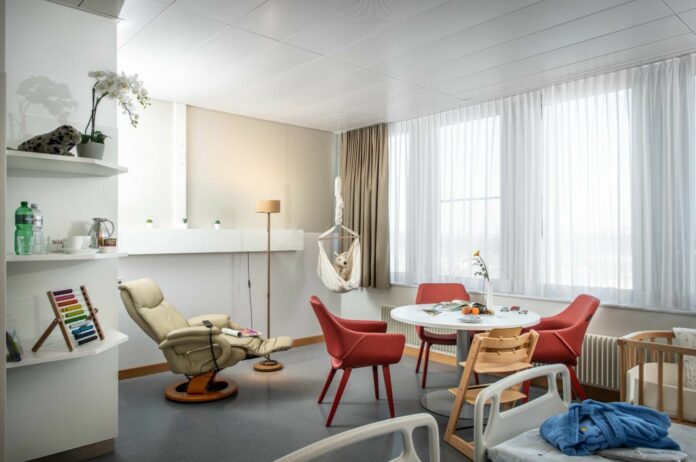Jana Kajanovič decided to work as a nurse abroad during her studies, when she traveled to Greece as part of the Erasmus program. Fate eventually brought her to Switzerland, where she now works in the intensive care unit.
How did you get to work as a nurse in Switzerland?
During my studies, I enjoyed reading articles and interviews with nurses who work abroad, including in Florence. As part of my bachelor’s studies, I had the opportunity to try working abroad – I went to Greece for Erasmus, where I spent one semester and I was excited about it. Since then, I knew that I wanted to work abroad and that I would do my best. I was thinking about England and Saudi Arabia, but unfortunately I couldn’t pass the English test. Then I met my current husband, who was working in Switzerland. I didn’t want to give up on my dream at first, but mainly because of my relationship, I decided to brush up on German. I found tutoring and then moved in with him. I went to a language school for the first 2 months, then found a part-time job in a restaurant and at the same time arranged for the recognition of my Czech education. Within 4 months of arriving, I already had a job in a home for the elderly, and after half a year in Switzerland I passed my state exams in German.
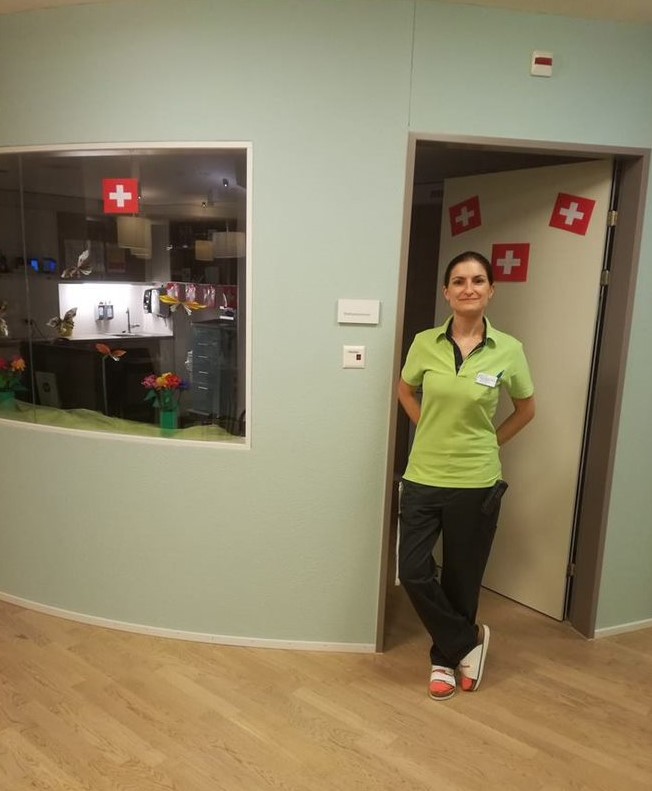
It’s amazing that you worked your way up like this and didn’t give up on the language, even though it didn’t work out at first.
Thanks to daily contact with local people, I learned German and started to speak. I worked in a home for the elderly for 2.5 years and then I decided to return to work in a hospital, which I did in the Czech Republic. Working in a hospital fulfills me much more than working with the elderly, I’m happy there. I worked in a small private hospital, initially in the Intermediate Care Department (IMC), where I was also for 2 years, now I work in the Spital Muri District Hospital in the intensive care unit.
What suits you more in a hospital than in a home for the elderly?
I like it when patients change and go to a standard ward or home. In the home for the elderly, it was more like social care, stereotype, regular clients, some with dementia. It was mentally demanding for me and after a while I felt that it was starting to border on burnout syndrome and that I had to change my environment.
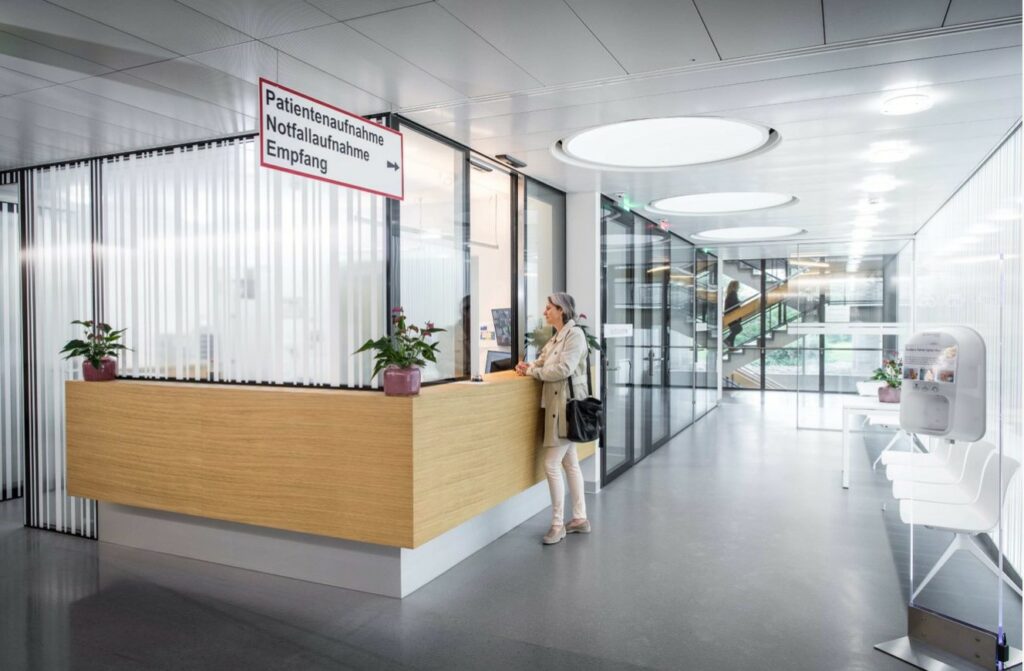
It’s great that you could try working in another country during your studies. Which school made it possible for you to do this?
Tomas Bata University in Zlín, Faculty of Humanities, General Nursing – Bachelor’s.
What excited you about studying in Greece?
To get to know a different culture, a different way of life. I was just starting with English in my bachelor’s degree, but I worked on it. Before I left, I also had tutoring, and then the daily contact helped me. I studied in the city of Larisa. Almost everyone there spoke English, but we also had a basic knowledge of Greek. It was a great experience, I met people from all over the world, I’m grateful for that.
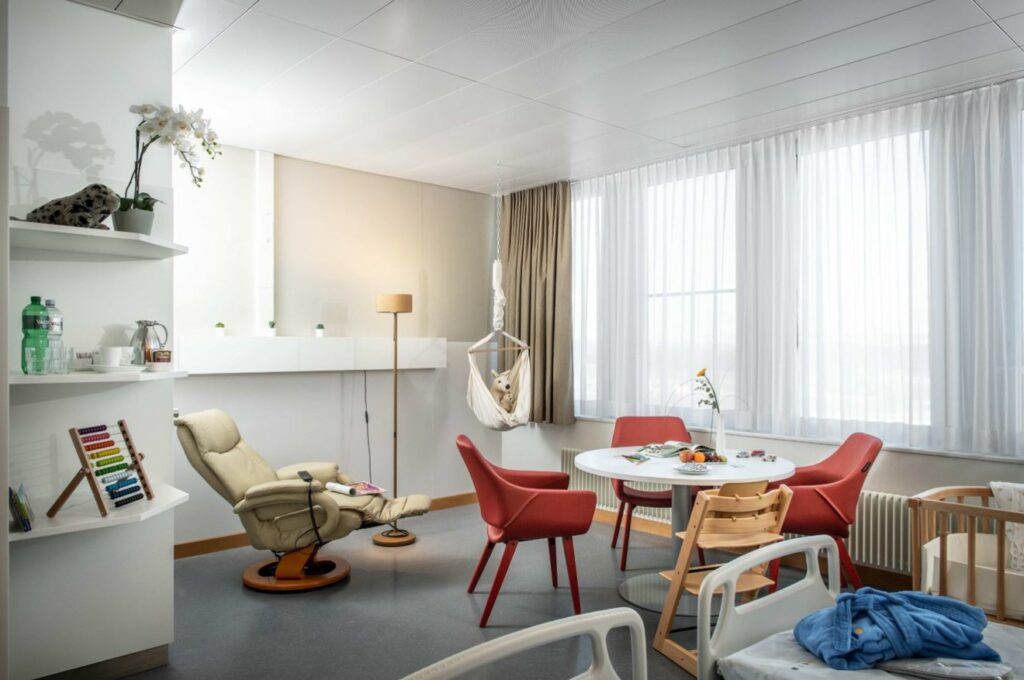
Have you noticed any differences between the Greek and Czech health care systems?
In Greece, the family was very involved in care, even in terms of food and hygiene.
Let’s go back to Switzerland, what caught your attention there? What were your beginnings in healthcare?
In Switzerland, they recognized my bachelor’s degree, here it has the same value as a certified nurse.
In order for my master’s degree in intensive care to be recognized here, I need to work 1 year in an accredited intensive care unit. I started working there last December. When I worked in the intensive care unit in the Czech Republic and a patient was ventilated, I was only in charge of the nursing part, the values on the ventilator were set by the doctor. Here I set it myself according to the patient’s needs, that’s new to me.
Do you have more powers in Switzerland?
Yes, I definitely have higher competence and independence. A lot of them prescribe reserve medications, which means that when a patient is sick or in pain, for example, they are prescribed various medications that can be given to them if necessary without contacting a doctor. I decide for myself what medicine to take and when.
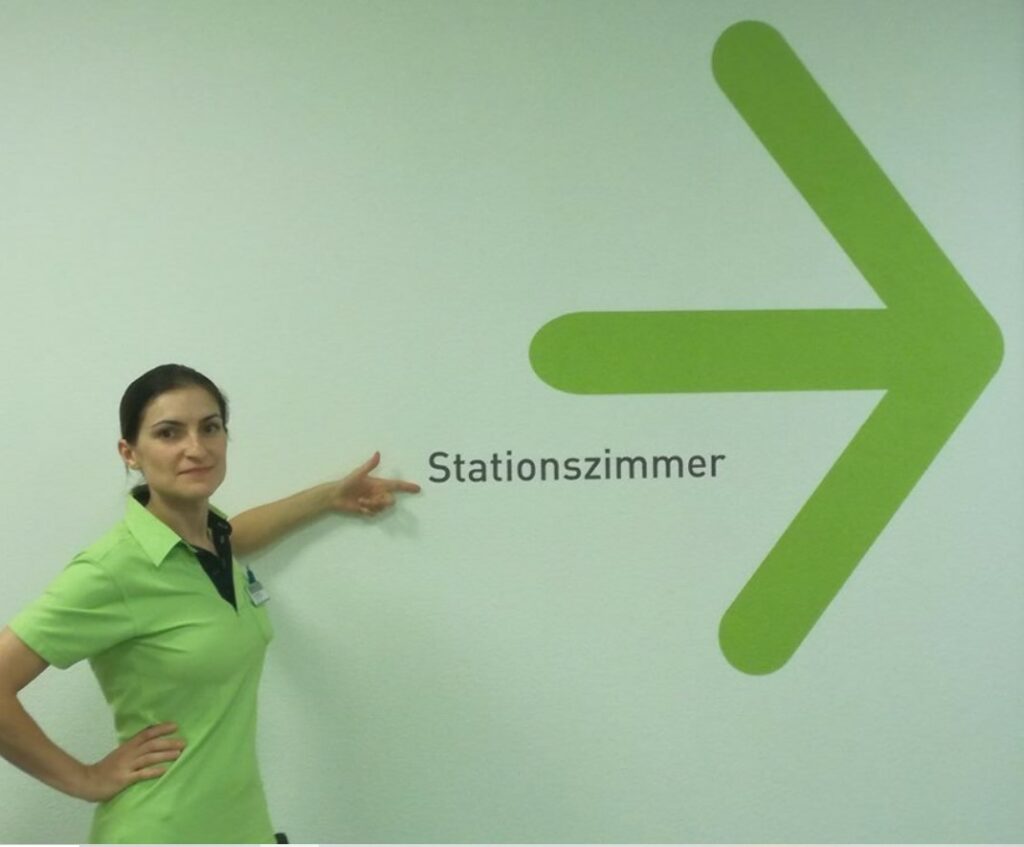
What was the biggest challenge for you?
Dealing with documents, understand it. Then language. German is spoken here, but a Swiss dialect. It’s not the classic standard German. I speak German, but I already understand the dialect now. In the beginning, it was very stressful for me to make phone calls because of the language barrier.
What are the other differences in healthcare in the Czech Republic and Switzerland?
The difference is, for example, in health insurance. Everyone pays for basic health insurance themselves, it is not automatically from their salary. In addition, the amount of the deductible is chosen, which means that each visit to the doctor is paid up to that amount, both during hospitalization and for the additional payment of medication and so on. As soon as the threshold is exceeded in a given year, the patient pays only 10% of each bill. The lower the deductible, the higher the monthly premium and vice versa. It is also possible to pay for additional insurance, which contributes to sports activities, alternative medicine, glasses, home care, travel insurance, vaccinations or even gynaecological treatment and dentists, which are not included in the basic insurance. Depending on the variant, it offers a free choice of doctor, hospital and the resulting various benefits (e.g. meals, single room, cosmetics, daily newspapers or the right to a rounds of 1-2× a day). For the highest level of insurance, everything is already fully covered.
Medical and nursing care remains the same, but patients with additional insurance have a different pleasant stay in the hospital.
Another difference is the possibility of euthanasia. It is a long process that takes several months. I have experience from a home for the elderly, where one client only took a pill and did not have to run an infusion. (Clients administer euthanasia themselves.) After his death, the police arrived and wrote it all down, which is standard procedure. The police are also called in the event of an unexpected death, whether in the operating room or in the hospital ward. Everything has to be left as it is, and the police will take pictures and document it. It is being investigated as an unexpected death.
Then there are differences in study. Students receive a partial salary during their internship. They have a training nurse, but they do a lot of things independently. In the Czech Republic, we only performed certain procedures during the internship, here the students are in charge of a specific patient.
Would you say that in Switzerland there is more emphasis on the patient’s wishes?
Many patients have a special document with them that declares whether they want to be resuscitated, who will decide on them if they cannot, or about organ donation.
I have noticed that when a patient says that he does not want something and does not want it, it is accepted. No one discusses or persuades him in any way. The patient’s wishes are respected. It is not the case that the doctor is in a superior position to the patient.
Can you think of any other differences within nursing care?
There is more emphasis on compliance with the rules, for example, in the procedure of administration or dosage of medicines. In our ICU in Spital Muri, everything is written down in detail and it must be followed. There are no 12-hour shifts, but only 8.5 hours. Morning, afternoon and night. I had to get used to it, everything has its pros and cons. Another difference is that in the ICU they also pay us for breaks. I don’t think that’s the case in the Czech Republic.
Telemedicine is commonly used here. In the Czech Republic, it was only introduced during the covid-19 pandemic, but here it works normally. The doctor examines over the phone.
Once I had bronchitis, so I had to take a picture of my red throat and cough. I see positives in this, because when a person is not well, they don’t have to go out and wait in the waiting room with other people. The doctor is able to issue a sick note, send it by e-mail, or send a prescription to the pharmacy and the pharmacy will send the medication directly to your home.
It is also interesting that if you make an appointment with a doctor in Switzerland and do not show up and cancel it 24 hours in advance, you will normally be charged.
That sounds like patients are perceived more as clients and health care provided as a service…
Yes, a service that the client pays for and behaves accordingly.
How is the lack of staff solved?
When there is a short-term or long-term shortage of staff in the hospital, recruitment agencies are contacted to provide staff. Such a person is expected not to be confused in the new workplace and to do the job fully. This is also related to higher earnings and the fact that they can determine where and when they go. It’s flexible work.
This is similar to the USA. Nurses who work in temporary positions usually have at least 3 times the salary.
I’m not sure about the salary of a temporary worker, it’s taboo to deal with salaries in public, but it’s definitely more than for a permanent employee, after all, the agency has to make something on it. The disadvantage is that temporary workers do not have accident insurance or other benefits covered by the employer like permanent nurses and have lower contributions to the pension system.
What is the atmosphere in the workplace and the attitude of colleagues?
So far, I’ve been very lucky with my colleagues – in the Czech Republic and Switzerland. I worked at two workplaces in Brno and I still visit my colleagues there. It didn’t quite suit me in the nursing home, but it was great at IMC. Overall, the Swiss are very particular about being interested in new workers, asking people how they are doing, and so on. We have teambuilding 1-2× a year, where relationships are strengthened, and various parties. In the Czech Republic, for example, my colleagues and I went to sit down after work – that’s not much here, but the atmosphere in the workplace is definitely pleasant.
Did you ever feel that it was a problem that you didn’t speak like a native speaker?
No, not at all. No one ever dared to say anything… Nobody even corrects me, which I would be happy about, because then I keep repeating those mistakes. Patients often ask me where I’m from, they are interested, but no one has ever let me know that my language, accent or pronunciation are a problem.
How does the position of a nurse differ in Switzerland and the Czech Republic?
I think that in the Czech Republic, before the outbreak of covid, a nurse was considered more like a nurse, and the public did not perceive the complexity of our work, that a nurse, for example, was in charge of several devices at once and administering medication, which is also not entirely easy. It’s not that the doctor prescribes and the nurse administers, the nurse also has to think critically, know the medication and know how to administer it, its interactions, side effects. It’s a big responsibility. When I say in Switzerland that I work as a nurse in a hospital, I can see that people admire it and respect my profession. But maybe that has already changed in the Czech Republic.
What would you recommend to nurses who are interested in working in Switzerland?
Definitely not to be afraid of it. I think the easiest way is to find an agency that will help with the recognition of education and finding a job, or with accommodation. I had the advantage that I already had a partner here. It is important to know the language. I was at A2 level, so only the basics, but during half a year of intensive study, I pulled it to B2. When looking for a job, the standard here is that you add an evaluation of your former job or current job to your CV and cover letter.
What are your plans for the future?
I would like to be recognized for my education in intensive care – that’s what I’m working on now. This is also related to better financial remuneration and I would like to reduce my working hours in the future.
How do you maintain positive energy and balance between your personal and professional life?
I try not to live just for work, not to take it home and do something else. Active movement helps me. I exercise regularly, bike in summer, swim in winter and like to travel. My family and friends recharge me a lot. Our holidays usually take place at home in Moravia, where I love various folklore events. I also like it when someone else takes care of me. I regularly indulge in cosmetics, hairdressing, massages, wellness and I like it when my husband cooks for me. I also need enough sleep and coffee.
Do you feel that the school has prepared you for the emotional demands of a nurse’s work?
I saw many stories of patients in my practice and it was also combined with theoretical preparation. But you have to sort out your emotions yourself.
I know that I would never be able to work with children because I wouldn’t be able to handle it mentally, especially if they were some more serious conditions. With the older population, after a while, I started to get exhausted from constantly repeating something over and over again and contact with family members. I worked in a private home for the elderly and sometimes I had the feeling that they thought the sisters were such girls for everything. For me, an adult patient in a hospital is ideal, and this is related to professional activities, of which there are much more in a hospital than in a home for the elderly, which I really enjoy.
Can you think of anything else you like about being a nurse?
Financial remuneration and the possibility of part-time work are motivating here. When a colleague returns to work after maternity leave, by the way, maternity leave is only 14-16 weeks, they reduce their working hours, there is no problem with it. I have more flexibility even in full-time services.
Do you remember any beautiful experience from work?
A wonderful experience was when I had an internship in the maternity ward and I could be at the birth. In general, however, I am happy every time the patient’s condition improves and he can leave on his own.
That sounds beautiful. Do you also remember any unpleasant experience?
I remember, back in the Czech Republic, when we were on night duty The family wanted us to contact them if the patient’s condition worsened, so that they could be with him when he died. Early in the morning, we already knew that the patient would not last very long, but the doctor refused to call the family, saying that he would not wake anyone up at 5 in the morning. That took me quite seriously. The patient died around 7 a.m. and the family was not with him. I went home with tears in my eyes. Unfortunately, in the Czech Republic, it is not in the competence of the nurse to inform the family about the patient’s condition, otherwise I would of course call them myself.
Is this another difference in the powers of nurses in the Czech Republic and Switzerland?
Not completely, but in the home for the elderly, I was able to inform the family about the client’s death myself. In general, dying is difficult for me. When it is known that the patient is going to die, but it takes a long time and he suffers, it is difficult for me. Fortunately, I encounter it less in the hospital.
Do you think that the approach of people in Switzerland to their health differs in any way?
Definitely. I believe that people here value their health more and actively do something for it. For example, in the gym where I go, the age category is about 60 and over. I’m probably the youngest there. There is a lot of widespread tourism and people buy from local farmers. I think that the locals often wonder whether to go to the doctor or call an ambulance, because it is also financially tied to it, not everyone can afford it so often. Rapid rescue aid is definitely not abused here as often as in the Czech Republic, because they simply know that it is not free. I also think that people don’t drink as much alcohol here as in the Czech Republic.



